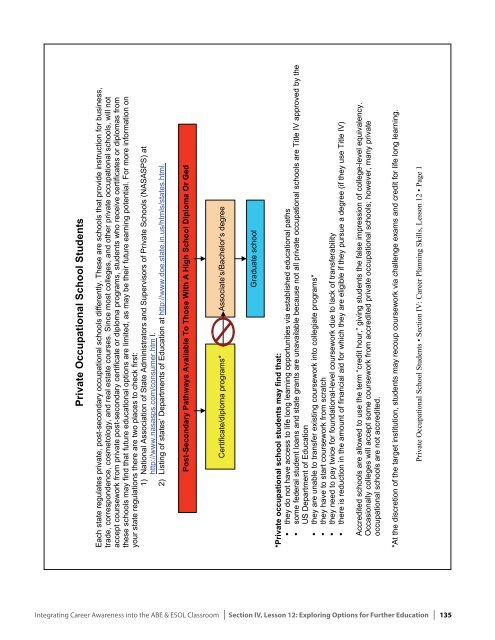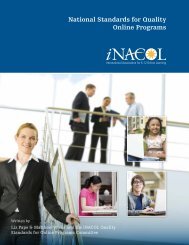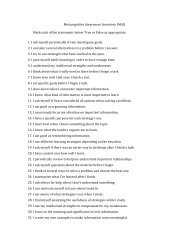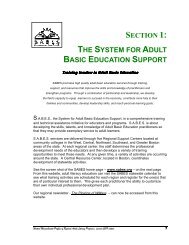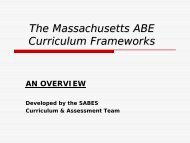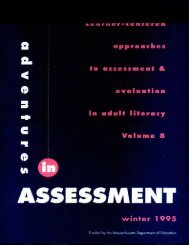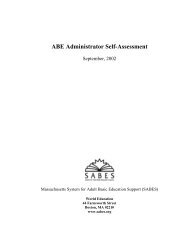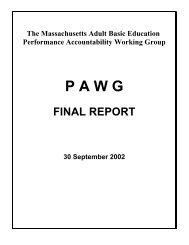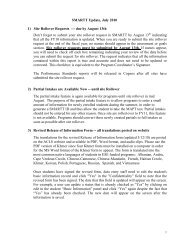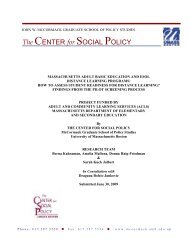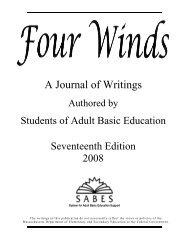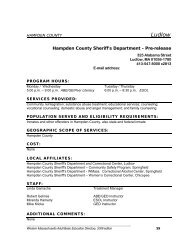Integrating Career Awareness into the ABE/ESOL Classroom - SABES
Integrating Career Awareness into the ABE/ESOL Classroom - SABES
Integrating Career Awareness into the ABE/ESOL Classroom - SABES
- No tags were found...
You also want an ePaper? Increase the reach of your titles
YUMPU automatically turns print PDFs into web optimized ePapers that Google loves.
Private Occupational School Students<br />
Each state regulates private, post-secondary occupational schools differently. These are schools that provide instruction for business,<br />
trade, correspondence, cosmetology, and real estate courses. Since most colleges, and o<strong>the</strong>r private occupational schools, will not<br />
accept coursework from private post-secondary certificate or diploma programs, students who receive certificates or diplomas from<br />
<strong>the</strong>se schools may find that future educational options are limited, as may be <strong>the</strong>ir future earning potential. For more information on<br />
your state regulations <strong>the</strong>re are two places to check first:<br />
1) National Association of State Administrators and Supervisors of Private Schools (NASASPS) at<br />
http://www.nasasps.com/consumer.htm l.<br />
2) Listing of states’ Departments of Education at http://www.doe.state.in.us/htmls/states.html.<br />
Post-Secondary Pathways Available To Those With A High School Diploma Or Ged<br />
Certificate/diploma programs*<br />
Associate’s/Bachelor’s degree<br />
Graduate school<br />
*Private occupational school students may find that:<br />
• <strong>the</strong>y do not have access to life long learning opportunities via established educational paths<br />
• some federal student loans and state grants are unavailable because not all private occupational schools are Title IV approved by <strong>the</strong><br />
US Department of Education<br />
• <strong>the</strong>y are unable to transfer existing coursework <strong>into</strong> collegiate programs*<br />
• <strong>the</strong>y have to start coursework from scratch<br />
• <strong>the</strong>y need to pay twice for foundational-level coursework due to lack of transferability<br />
• <strong>the</strong>re is reduction in <strong>the</strong> amount of financial aid for which <strong>the</strong>y are eligible if <strong>the</strong>y pursue a degree (if <strong>the</strong>y use Title IV)<br />
Accredited schools are allowed to use <strong>the</strong> term “credit hour,” giving students <strong>the</strong> false impression of college-level equivalency.<br />
Occasionally colleges will accept some coursework from accredited private occupational schools; however, many private<br />
occupational schools are not accredited.<br />
*At <strong>the</strong> discretion of <strong>the</strong> target institution, students may recoup coursework via challenge exams and credit for life long learning.<br />
Private Occupational School Students • Section IV: <strong>Career</strong> Planning Skills, Lesson 12 • Page 1<br />
<strong>Integrating</strong> <strong>Career</strong> <strong>Awareness</strong> <strong>into</strong> <strong>the</strong> <strong>ABE</strong> & <strong>ESOL</strong> <strong>Classroom</strong> | Section IV, Lesson 12: Exploring Options for Fur<strong>the</strong>r Education | 135


